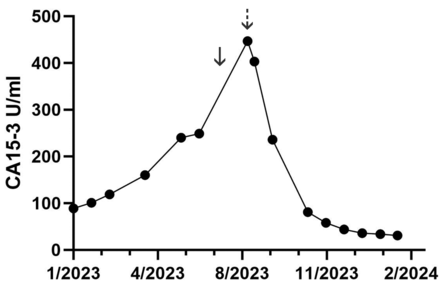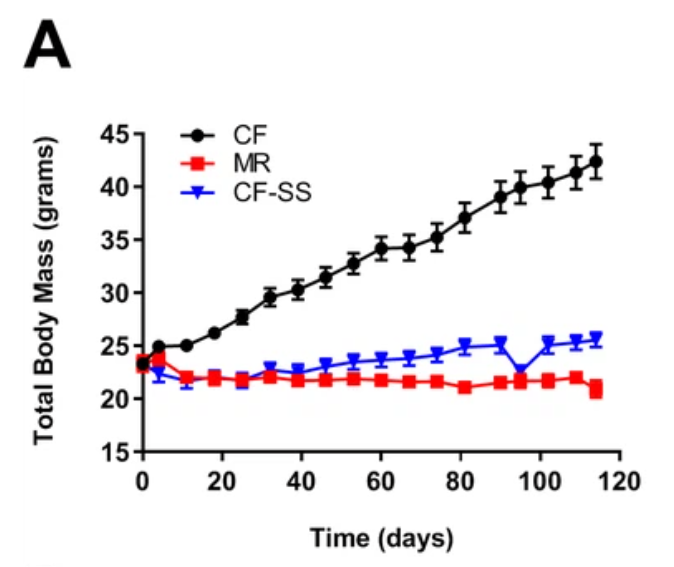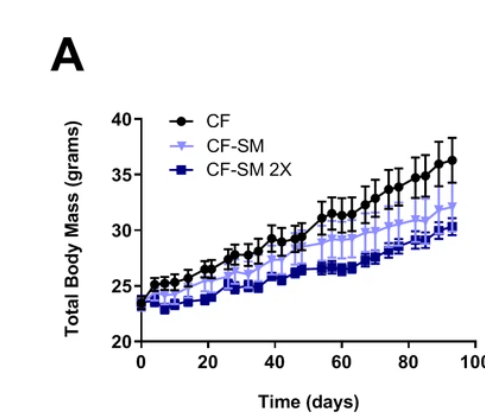Methionine/Cysteine restriction increases longetivity AND energy expenditure
-
@Ecstatic_Hamster
You could eat ice cream. For most people it's even tastier than milk and some ice creams have less than 1g of protein per 100g.
I actually eat a lot of milk products on MR like cream, ricotta cheese, ice cream,... No lentils or legumes.
Lots of juices and fruits. -
@forty thanks


It's my favorite subject ATM, too. I haven't been that interested in a topic in quite a while.
BTW protein restriction is also the last big change that peat talked about before he died. So we could see it as a last pointer in which way to go. -
@Mauritio said in Methionine/Cysteine restriction increases longetivity AND energy expenditure:
@Ecstatic_Hamster
You could eat ice cream. For most people it's even tastier than milk and some ice creams have less than 1g of protein per 100g.
I actually eat a lot of milk products on MR like cream, ricotta cheese, ice cream,... No lentils or legumes.
Lots of juices and fruits.That’s a good point. Interesting…
-
@Mauritio said in Methionine/Cysteine restriction increases longetivity AND energy expenditure:
@revenant said in Methionine/Cysteine restriction increases longetivity AND energy expenditure:
Both methionine and cysteine are used by the body to grow hair. I wonder if going very low would result in hair loss. How are the met/cys-restricted rodents looking in terms of fur?
These last days since your message I have noticed a lot more hairs in my sink and I couldn't attribute it to anything else than my diet change.
So today i had the first normal protein day for the first time in like 10 days. And I already notice less hair loss, so there seems to to be a connection.
That is a bit worrying, although I would think lack of those amino acids would not necessarily result in increased shedding but thinner/slower hair growth.
FWIW, I did a high-protein diet for 3 months and then low-protein for 3 months and my hair seemed to grow longer than normal on the high-protein diet and slowed down on the low-protein diet. But the high-protein diet caused weight gain also.
-
@revenant It is indeed. Maybe it was a coincidence, I ll have to try it a few more times.
This also reads like methionine is important for hair:
https://pubmed.ncbi.nlm.nih.gov/8721497/ -
"All cancer types are addicted to methionine, which is a fundamental and general hallmark of cancer known as the Hoffman effect."
There is a lot research being done on MR as a cancer treatment. In this case it worked quite well the volume decreased and remained stable . The treatment also involved chemotherapy,temozolomide and and enzyme called methioniase, which breaks down methionine.
Taking methioniase would be an easy way to selectively reduce methionine and cysteine in the body. I couldn't find it as a supplement but there are certain bacteria producing it.
"l-Methioninase from the newly isolated Methylobacterium sp. has promising characteristics towards anticancer drug developmental studies."
This case study is even more impressive the tumor was rapidly growing and after the beginning of the treatment, which included methioniase and MR the tumor markers came quickly back down to normal

That one is impressive as well. Glioma has a 5 year survival of 6.8% and 2 out of 5 mice were cured, no mice died. Not too bad.
"In the orthotopic nude-mouse model, the combination of TMZ and a methionine-deficient diet was much more effective than TMZ alone: two mice out of five were cured of glioma by the combination. No mice died during the treatment period. Methionine restriction enhanced the efficacy of TMZ in MGMT-negative glioma without inducing MGMT, demonstrating potential clinical promise for improved outcome of a currently incurable disease."
-
In this study they looked if taurine supplementation was able to reverse some of the benefits of MR .
They found out the opposite: taurine further decreased adiposity on a MR-diet.
So it looks safe and useful to supplement taurine on MR.
Interestingly on a normal-methionine /control-diet, taurine did not decrease adiposity, only on MR."Taurine supplementation of MR rats did not restore weight gain or hepatic Scd1 expression or indices to CF levels, but further decreased adiposity."
-
@Mauritio said in Methionine/Cysteine restriction increases longetivity AND energy expenditure:
Methylobacterium sp.
Are you considering trying to source Methylobacterium-sp for research/experimentation? I hope anyone who finds a source or undertakes an experiment will share details and provide reports -- to see if methionine/cysteine restriction could be achieved by methionase or a methionase-generating bacterium.
Two sources come up on the first results page from a not-so-thorough search:
https://webshop.dsmz.de/en/bacteria/Methylobacterium-sp-oxid-48.html -
@T-3 no not really.
The prices of the products you listed are astronomical and I'm not even sure if they're for human consumption.I was looking for a methioniase supplement but I didn't find anything.
-
@Mauritio I have a reliable source. One month worth of methioninase is a thousand usd.
-
@Ecstatic_Hamster are you experimenting with it? If so how long, and any noticeable effects?
-
@Mauritio - This is continues to be a great thread. In the link below, Dr. Peat explains what Broda Barnes discovered when he doubled his protein intake.
Dr Ray Peat - Blood Tests, Hormones, Protein Intake, & Ray's Carb List
-
@evan-hinkle said in Methionine/Cysteine restriction increases longetivity AND energy expenditure:
@Ecstatic_Hamster are you experimenting with it? If so how long, and any noticeable effects?
No not right now. I am moving more to lower protein and more plant options.
-
Instead of looking for hacks to mitigate the negative effects of methionine just stop eating it. Its like complaining you can't lose weight while stuffing yourself with fast food every day. This guy is catching on but not quite there yet:
@DavidPS said in Methionine/Cysteine restriction increases longetivity AND energy expenditure:
As you can see, the greatest source of methionine comes from foods of animal origin, especially chicken and fish. I am unwilling to adopt a diet based solely on plant foods and I use glycine to balance the methionine in my diet (after I have reduced it to an level that I still find appetizing).
Just follow Kempner's rice diet if you don't know where to begin. Eating only plants won't make you gay. Anyone experiencing insatiable hunger on high C, low P/F, might just not be eating enough. See posts from Kelj on old RPF. The more carbs you eat the higher you can push and restore metabolism.
I was at around 6k+ calories for a few weeks before it slowly dropped off. Eat to appetite even if that means 6k cal. When the food stops tasting good and you want to push the plate away, that's when your body has had enough. Something like 1400g carbs, 100g protein. Lots of table sugar, like in Kempner's where they added up to 500g of it. Even substituted some rice for mung bean starch since the protein in rice becomes unpalatable after eating a couple stacked plates of it.
Eating around 4000 now but I don't really track. Protein usually ends up under 70g. Mostly just fruit, tubers, leaves, rice, sugar. There was some vegan peating discussion on old RPF. Westside PUFAs had a thread, others I can't recall off the top of my head. Cirion had an interesting thread on self-experimenting with Protein/AA restriction.
-
@DavidPS That audio clip speaks directly to this thread.
In it, Peat mentions:
(i) Broda Barnes' finding that doubling dietary protein doubled his exogenous NDT requirement;
(ii) after the age of 30, aminio acids "of replacement" (especially methionine and cysteine) become inflammatory (at least in excess), and restricting them can be especially helpful for people that don't respond well to thyroid supplementation and/or have paradoxical inflammatory symptoms;
(iii) Peat recommends a 1:7 ratio of protein to carbohydrate or, equivalently (with some other assumptions about macros), 80-100g of protein in a 4000 calorie diet for a 30-year old man should be adjusted downward to 40-50g of protein in a 2000 calorie diet for an 80-year old;
(iv) limiting M-TOR with dietary methionine restriction (or taking rapamycin, as advocated by Tarmander at RPF) are worth considering as life-extension strategies based on the rodent studies @Mauritio posted in this thread.Thanks for so consistently focusing us and directing attention to what's germane and highly relevant!
-
This post is deleted! -
Here's a highly interesting study focusing on to what degree selenium supplementation can replace methionine restriction. And the answer is: to a surprisingly large degree, but not completely.
MRs benefits on weight were completely repeated by selenium supplementation. They were almost immune to weight gain on high fat diet.
The mice fed selenium even had a little bit more lean mass, although were also bit longer.
![a[link text] ))))
))))The authors hypothesize that all of this is downstream from IGF-1 reduction. They cite a bunch of studies showing IGF-1 reduction being critical to (some) MR benefits.
And selenium reduces IGF-1 to a similar degree as MR.FGF21 was not the same in both groups. Selenium had almost no effect on it in young male micr. This is why selenium only partially replicates MR. As discussed many times in this thread FGF21 is central to MR's benefits and I think the increase in klotho is downstream from it as well. So that is missing when taking selenium, hence why I don't think selenium supplementation will have as drastic of an effect on longevity as MR.
That was in younger male mice, in older female mice the effect on FGF21 was pretty drastic so there might be sex or age specific effect going on.The authors fed sodium selenite but also checked selenomethionine, which was quite a bit less effective for whatever reason. They checked different dosages so it probably wasn't that.
So if you want to replicate this study using sodium selenite is your best bet.
Unfortunately Brazil nuts contain mostly selenomethionine so that won't be perfect either .Body weight on selenomethionine

@DavidPS this might interest you.
-
great find, thank you. I wonder what the HED would be.
-
@Mauritio - Thanks for the science.
Selenium has many roles in the body and I do not fully understand them. Selenium, the Thyroid, and the Endocrine System
The type 2 deiodinase enyzmes that convert the inactive thyroid hormone T4 into the active form T3 are selenium-dependent. I am wondering if the control-fed (CF) animals were eating a selenium deficient diet during their entire lives. They could possibly have been hypothyroid and the lack of weight gain after selenium supplementation may have been related to a correction of their hypothroidism.
The amount of selenium in a brazil nut varies from tree to tree. The amount of selenium in a brazil nut depends (in part?) on the amount of selenium in the soil.

-
@Ecstatic_Hamster - Haidut mentions the HED for selenium in this interesting post from 2022.
http://haidut.me/?p=1755